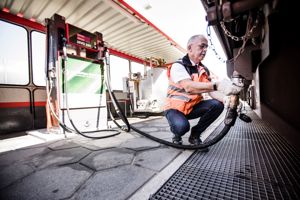Shell supplying hydrotreated vegetable oil to Deutsche Bahn for rail applications
With the need to reduce CO2 emissions from the large number of existing vehicles around the globe, developing fuels that help meet sustainability needs is a priority for Shell. This includes the use of high-quality fuels with renewable components as well as nature-based solutions across different transportation sectors and applications, including trucks, cars, off-road and rail.
Tackling rail as a sector which can be hard to decarbonize, Shell is supplying Hydrotreated Vegetable Oil (HVO) to Deutsche Bahn, the national railway company of Germany, for their rail applications which are not electrified. This began with the Sylt Shuttle train, which is one of the most well-known and picturesque train connections in Germany. This is an important milestone to demonstrate the importance in neat HVO channels for existing modes of transportation to achieve substantial decarbonization.
“HVO is a fully renewable diesel fuel which meets the requirements of EN 15940 for paraffinic diesel fuels. For this application we source HVO derived from waste and residues, thus not competing with food and feed production,” said Felix Balthasar, Manager for Shell Specialty Fuels. “HVO plays a crucial role in helping meet the requirements of customers seeking sustainable fuel solutions without changing of refueling infrastructure or vehicle drive trains.”
Shell is also working with Volkswagen and Bosch and other partners to produce renewable low-carbon R33 Blue Diesel and Blue Gasoline for use in existing vehicles. Both fuels are blended by Shell and contain up to 33 percent renewable content which helps ensure a reduction in carbon emissions of at least 20 percent per kilometer driven and with compensation of remaining emissions.
R33 Blue Diesel is a high-quality diesel that contains up to 33 percent renewable content and meets Europe’s EN 590 standard for diesel fuel. It is technically comparable to a standard diesel fuel that is compatible with traditional drivetrains and existing refueling infrastructure, while also helping consumers to lower their CO2 emissions and meet their carbon reduction targets. There are already more than 10 public fuel stations for R33 Blue Diesel across Germany giving also the general public access to high quality sustainable fuels.
Blue Gasoline complies with Europe’s EN 228/E10 standard and exceeds it in parameters such as storage stability and distillation behavior. The fuel is hence particularly suitable for use in plug-in hybrid vehicles. Lately, to complement the portfolio of renewable fuels the ADAC GT Masters is using Blue Gasoline 98 GT Masters for the German GT Championship. This innovative novel product contains approximately 50 percent sustainable components (compared to approximately 10 percent in standard E10 fuel). ADAC GT Masters and Shell are making an important contribution to improve carbon reduction in motorsports with the new fuel.
Shell recognizes that a broad range of cleaner energy solutions are needed across the many forms of transportation; HVO, R33 Blue Diesel and Shell Blue Gasoline are available to provide immediate application. Vehicles using the above renewable fuels across sectors and applications have traveled about 500-MM kilometers since 2018.







Comments